Table of Contents
Are you a total camping novice? Do you know the essential skills for camping?
Whether you’re an experienced camper or on your first camping trip, making sure your camping basics are up-to-date never hurts. Outdoor spending is a great way to relax and interact with nature, but if you’re unprepared, it can also be unpleasant.
Let’s face it, anyone can camp and be miserable. But a bad experience camping is typically the last experience camping.
We hope that by teaching you the basic skills, your first camping experience will be unforgettable and awesome!
Through learning the necessary skills and, most importantly, putting this knowledge into effect, you will concentrate more on nature and surroundings and less on the stress and frustration of not understanding the basic skills of camping.
For the first time, I strongly recommend camping with someone who is an experienced camper. But even then, before planning your first camping trip, there are some essential skills you need to know about.
1. how to plan a camping trip

Not planning is also planning to fail
The main cause of most missed camping trips is lack of planning. The answers to these basic 5 questions depend on successful planning:
- Where are you going?
- How long are you going to be staying at that location?
- What is the weather forecast?
- What gear do you have and need?
- And, what will you do when you arrive?
You will start collecting your gear once you answer the five basic questions.
You’ll need to learn where to get water as well.
Is it ready to go, or do you need to carry 5-gallon jugs?
If required, do not forget to make reservations for campsites.
Make a list of the equipment you take as a guide for each ride. Edit your lists after each trip, develop them and save them for future trips.
Finally, plan to show up for Murphy (Murphy’s Law). In other words, if things go wrong, have a strategy.
2. what should you bring

Most new campers make the mistake of bringing too much material. You don’t want to forget and say “just in case,” right?
Overpacking can be an unwelcome danger on your first camping trip.
Let me help you avoid this blunder by providing you with an appropriate checklist that you can tailor to your needs. Cooking, sleeping, and some creature comforts will be included in this article.
It can be expensive to buy supplies. For your first few journeys, borrow or rent equipment to get a sense of what you really need.
3. learn basic first aid/CPR

It’s always good to carry a basic kit of first aid.
But if you don’t know how to use what’s in your bag, it’s not really useful to use your first aid kit.
You don’t need a full-blown complete crash kit, just a range of bandages, ointments, and simple medicines like Benadryl and a pain reliever.
When you schedule your trip sensibly, there is a significant reduction in the likelihood of facing a true medical emergency.
Using the tools and training just in case, however, is always easier.
4. wear appropriate clothing

The number one way outside to be unhappy is to wear the wrong clothing.
Remember to bring comfortable, breathable, and warm multiple layers. Search for fabrics that are non-cotton, and you don’t mind getting dirty.
Start with a base layer (t-shirt) and then add a mid-layer like a sweatshirt or a light fleece. Finish with a quickly added or optional warm coat.
A big down puffer coat is important, and when the sun goes down, it will keep you from getting chilled.
If you get warm until you are comfortable, you can always remove layers.
Don’t forget the gloves and hat.
Also, camping in summer can get cold, and you never know when you might need some extra warmth.
5. pick the right spot

It can be overwhelming for beginners to find the perfect place to set up camp.
Follow these simple rules, and you’re going to feel like a master camping designer: when you arrive at your campsite, your first job is to pick the spot where you’re going to pitch your best tent.
Instead, inspect the area to ensure that there is enough space between other campsite components, such as the fire pit and picnic table.
Note, if you are not in an existing camping area and choose a spot from scratch, you will have many factors to consider, such as: finding a level area for your tent, proximity to the car, distance to the campfire, accessible water and wind and sun safety.
The ideal spot has a soft soil or ground cover flat, level surface.
Remove areas that are rugged. Set up your tent as far away as possible from the cooking area and the fireplace to prevent odors from the campfire or food.
You’ll get better at picking an ideal location every time you set up a campsite.
Look at this video to find a great campsite spot:
6. pitch a tent correctly
I love all outdoors, but I like having my tent outdoors.
Find an even, flat surface with plenty of room to move around before you pitch your tent.
Make sure there are no bumps, rocks, sharp objects, or any other obstacles that would be it difficult to sleep in your tent.
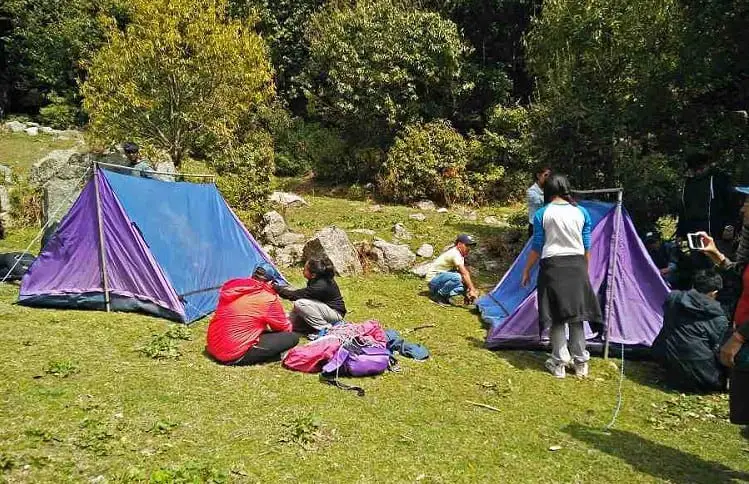
You may need to learn how to stake down the corners, mount the poles, add the board, and put on the rain fly, depending on the tent you choose.
Most tents come with instructions before you’re at the campsite, so read and understand.
You should practice a few times setting up your tent in the backyard to gain skills and feel more confident when you’re away from home.
Note that the aim is to sleep like a newborn, wake up well, and dry.
7. how to build a fire
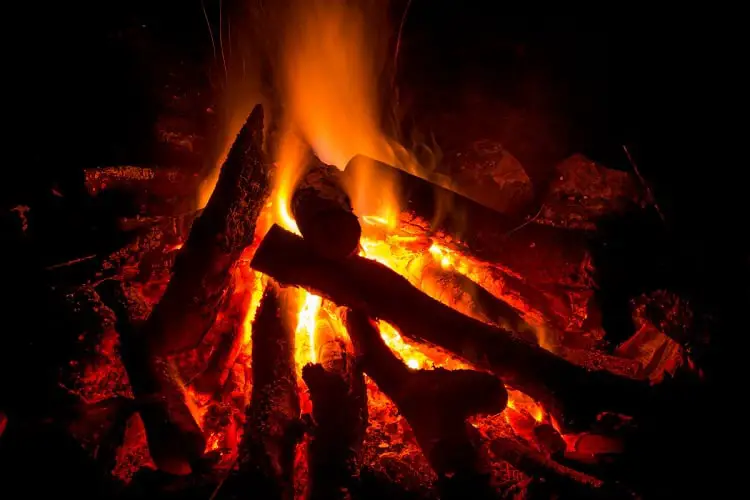
I see fire as an integral part of the experience of camping.
Understanding how a campfire can be constructed, started, and managed is a valuable skill that takes practice. Not only does a campfire cook, but it also offers heat and warmth.
Three main points to remember:
- Wood, dry and not wet
- good airflow
- consistent temperature
Watch this video on starting a campfire:
Begin by clearing the area of flammable debris, gathering tinder (e.g., dry grass, leaves, and pine needles), some lighting (e.g., small twigs), and wood before building a campfire.
It seems like a no-brainer to get a fire started, but for beginners, it can be difficult.
Start by putting in the center of your pit a small amount of tinder. Leave enough space for the tinder to light up and allow airflow to help with the start process.
Heat the tinder from the bottom and add lighting progressively, slowly increasing the material’s diameter as you go.
Once the fire is burning steadily, you should gradually add larger pieces of firewood until a useful size fire is reached.
At first be sure to use dry wood and then moist wood should be fine to use once the fire is built.
You don’t need a bonfire to cook or stay warm when you build your first campfire.
When building a fire, all campers will obey these safety precautions:
- Never leave an open fire unattended.
- Only burn tinder, kindling, and wood.
- Always extinguish the fire completely.
Campfires are not always allowed, so check with your campsite before.
Until leaving, make sure you are completely aware of the rules, regulations, and restrictions on campfires for your destination.
8. basic knots

It may not seem important to tie a knot, but it can be a valuable skill on a camping trip.
When you tie a tent, hang your bear pack, or secure your transportation equipment, clothes and knots are essential tools.
There are many knots, but only those that you regularly use will be recognized. A few basics to learn are a clove-hitch and a bowline.
These are the most suitable for beginners camping.
There are many online resources teaching knot tying, just look for YouTube or find a pocket guide in your local bookstore.
9. Use a knife safely
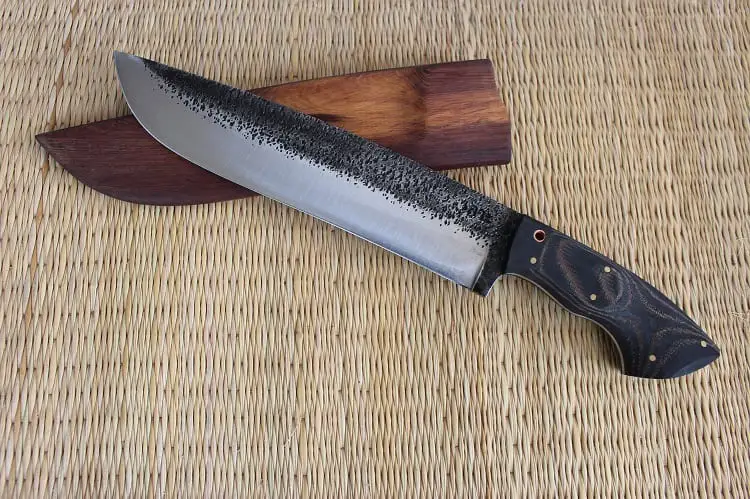
Most new campers do not want to carry a knife, but for many things, from cutting rope or steak to opening food containers and spreading peanut butter, carrying one is handy.
The best camping knife is the one with which you feel most comfortable.
Pick one you like and learn to take good care of it, so when and if you need it, it’s set.
10. Water purification
Water is necessary whether you are indoors or outside. It is also critical to consume safe water, and even if you discover it in nature, do not assume it is okay to drink.
You must purify the water before consuming or using it. You can now bring bottled water with you, but it will add to your load, and you may run out.
Iodine tablets can be used to purify water found in streams, although it is a time-consuming operation.
Another approach to confirm that the water is safe to drink is to boil it. Personal water filters are also available, and they can be used to filter water and remove contaminants.
11. Cook over an open fire
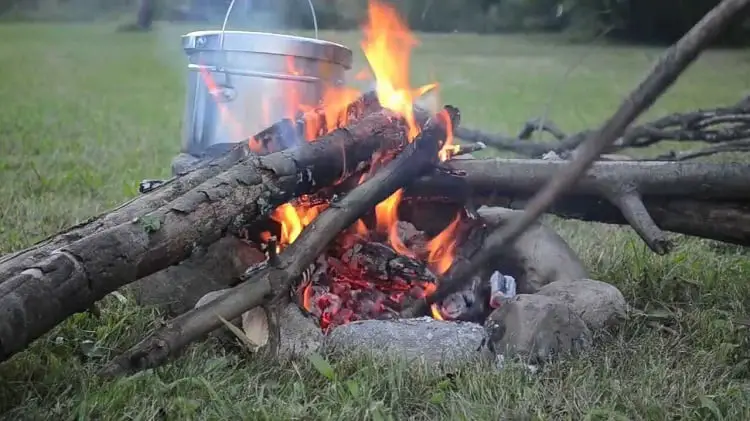
You can’t take your kitchen to the campsite with you.
So, you’ll need to learn how to cook simple recipes either with an open fire or on a camp stove.
For the first night, a simple no, hassle dinner is a must. Once you arrive, set up your site to enjoy some snacks.
We usually bring ready-to-eat cheese, bacon, crackers, hummus, veggie sticks and pita.
Then for dinner, we’re going to heat up chili or stew in a pot over hot embers that we prepared at home.
Make sure that when handling hot pots and pans, you wear an oven mitt or gloves.
Simply bring some camper’s canned goods and the best camping stove, and that’s perfect too.
Practice at home using stoves and burners, and when you’re out there with hungry mouths to feed, you’ll know exactly what to do. And if you’re like me and want coffee every morning, it’s important to have a reliable French press. Warm up some water, scoop in, press your favorite roast and enjoy hot coffee in minutes.
Also, store food securely in animal-proof containers at night or hang food in a tree if you’re in a bear country.
12. Hiking capabilities
Camping entails a lot of hiking, and it is critical that you have knowledge of how to overcome some of the hiking problems. Carelessness when trekking might result in severe injuries, turning a camping trip into a nightmare. As part of your trip, you may have to climb rocks, stroll through the forest, or even cross rivers.
When participating in such activities, you should be aware of the precautions to be taken as well as the necessary equipment. Sharp items might also make it difficult to navigate to the other end. When crossing rivers, it is critical to wear footwear that protects you from particles on the riverbank.
Rivers may appear shallow, but they may be deeper, causing your clothes to become entangled. Worse, you may become overwhelmed by water, which can be dangerous if no one knows how to swim.
When crossing rivers, you can choose to utilize ropes to enhance your experience. It’s more enjoyable to cross rivers with ropes than it is to navigate through the stones with your feet.
When it comes to hiking, you should only do things that you are confident you can do to avoid injuries. Campers who sustain injuries while trekking is constantly attempting new activities that they should have done before the camping trip.
You should never utilize hiking activities as a trial run for something you believe you can do but have never done before.
13. how to leave a campsite
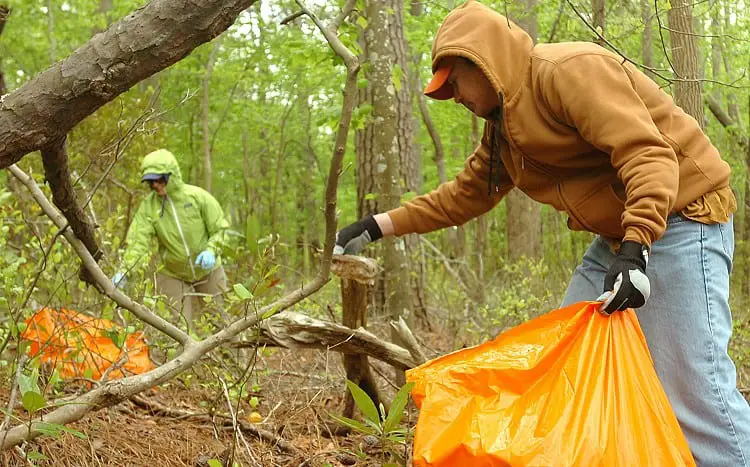
If you follow the “Leave No Trace” rule, when you leave, your campsite will be in better condition than when you arrive.
Go through the site thoroughly, and clean up once all your gear is packed.
Take all the trash, food scraps, and debris (including the trash left by others), then double-check just before you leave.
Pack all your trash and put it in suitable containers.
Most importantly, make sure you wipe out your fire completely before you hit the road.
14. Know how to read a map
Even while GPS has made movement easier, it may not work in every situation, the battery may die, or it may not receive a signal.
As a result, it is critical that you learn how to read a map in order to navigate the camping grounds.
15. Plant and animal identification
Every camper should be familiar with a variety of animal and plant species. It is useful not just for locating prospective food sources but also for identifying potential hazards.
If you see a wolf, for example, you will be more cautious than if you see a dog. The same is true for other plant species — some of the flowers or leaves may be poisonous, and eating or touching them is deadly.
16. Survival techniques
When it comes to camping, survival skills are also essential. They make you feel more prepared and safe in any situation, especially if it is unexpected, such as a natural disaster.
Survival knowledge is difficult to acquire and master since it requires both physical and mental strength, stamina, practical skills, and first aid knowledge. However, there are certain survival classes available, so even a basic understanding is doable.
17. Mental energy
Mental fortitude and resilience to harsh conditions and events are equally crucial as physical strength. It enables you to make rational decisions and maintain your cool in stressful times.
Mental stamina may be a skill that you are born with, but if it is not, you can learn it. It is advisable to put it into practice in real life by participating in a variety of camping trips with different individuals and in varying settings.
18. Examine the weather
With the Weather Channel and other weather apps for your phone, most people no longer bother looking at the sky for their weather. The issue is that cell service is not always available when camping. So you must be able to look at the sky and predict what will happen.
It’s a useful talent to be able to detect and understand whether a storm is forming or whether it’s just a gloomy day.
19. learn to tell one great campfire story
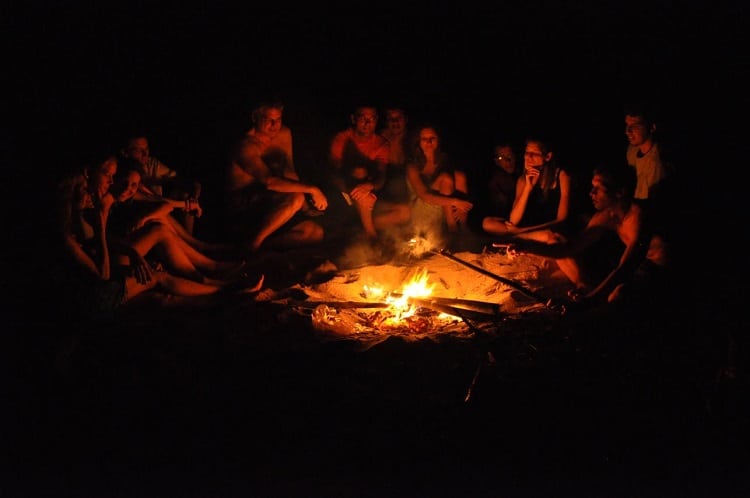
Nothing beats gathering and telling epic sagas or spooky tales around a roaring fire.
A great storyteller will take you into the adventure, and when you’re comfortable around a warm fire, no one worries about that.
Once you hit the road, it doesn’t hurt to have some ideas in your head.
How many of these talents do you already possess?
How many updates do you need?
Camping is an experience involving some simple know-how and some important gear parts.
And, it’s also important to share these basic skills with your entire family.
After learning and practicing basic camping skills, you will quickly discover that camping is an amazing adventure regardless of place, weather or length. What’s your thinking? In the comments, let us know.

